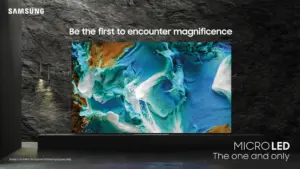It is important to make the point that MicroLED technology is ideally suited for mid-to-large size displays, making it perfect for laptops, tablets, monitors, and TVs. Yes, high production costs have limited its widespread adoption in these applications but that is why we at VueReal have committed to addressing these cost challenges to enable the unique advantages of MicroLED displays—such as high reliability, exceptional transparency, low power consumption, extreme performance, and superior color purity—to be realized at a cost competitive with OLED.
Another significant advantage of MicroLED technology is its exceptional transparency. This is another unique opportunity for the technology to succeed in the market. MicroLED displays can achieve over 70% transparency in mid-to-large sizes, a remarkable improvement over OLED displays, which max out at around 40% transparency, even with large pixel areas.
With capabilities exceeding 5000 nits of brightness and significant advantages in longevity and efficiency, MicroLED will redefine how we interact with our screens. First, the extraordinary brightness levels surpasses current OLED displays, known for their vibrant colors and deep contrasts but plagued by burn-in issues and shorter lifespans. Unlike OLEDs, MicroLEDs do not suffer from burn-in, ensuring a longer-lasting display solution with considerably lower power consumption. This efficiency makes MicroLED an attractive choice for consumers and manufacturers alike.
The high costs of MicroLED technology arise from various factors, including materials, repairs, operational expenses, and capital investment. Traditional MicroLED transfer technologies have added to these challenges.
The industry is working to address these blockers to the growth of MicroLED and we are succeeding. Our QuantumVue technology integrates with our proprietary MicroSolid Printing platform with its patented dynamic quantum dot (QD) patterning. This combination can integrate MicroLEDs precisely onto large substrates at high throughput and yield.
We looked at reducing material costs by efficiently transferring small flip-chip MicroLEDs and optimal wafer utilization. This high throughput and straightforward approach leads to lower operational and capital costs, enabling the production of high-performing mid-to-large displays at competitive prices while requiring a fraction of capital cost of OLED to scale to high volume. So, there are options available to manufacturers today to deliver competitive MicroLED mid-to-large size displays.
Another benefit of the technologies that we have been developing is the ability to reduce repair costs for mid-to-large displays to nearly zero. The challenge of repairing MicroLED displays during the manufacturing process is enormous. Yet, manufacturing processes like MicroSolid Printing, ensures low defect rates while using QD for the remaining defects is easy and cost-effective.
We have also worked on innovative approaches to backplane design that allow for very low-cost fabrication while incorporating multifunctional pixels. This capability enables the creation of versatile displays that can perform various functions beyond simple image rendering. The multifunctional nature of these pixels opens new possibilities for display technology, enhancing user experiences and providing more value in a single unit.
The transition from OLED to MicroLED is not just a technological upgrade; it’s a significant leap toward a future where display capabilities are boundless. With innovators leading the way, MicroLED technology stands ready to transform the landscape of display technology. Companies like VueReal and the increasing investment in MicroLED technologies is delivering real results and solutions that are overcoming many of the hurdles and barriers to wider MicroLED display adoption. That is not just good for companies like VueReal but it is good for the whole display industry.

Reza Chaji is CEO and founder of VueRreal. He has over 20 years startup experience in different capacities and an impressive resume of achievements in the display industry. He believes VueReal’s MicroSolid Printing Platform is the first to address the transfer challenge and enable the cost-effective development of innovative MicroLED displays at scale.

